Mezna Al Ali, representing the UAE Higher Colleges of Technology (HCT), was crowned the winner of the 2024 Scientific Poster Competition, which took place between Zabeel Hall 3 and Zabeel Hall 6 link on Tuesday.
Her submission was on the topic, “Prevalence and correlation of Transfusion-Transmitted Infections (TTI) with the distribution of ABO, Rh and Kell Blood Group Types among Blood Donors in Abu Dhabi, Al-Ain, and Al-Dhafra regions, UAE; A 5-Year Retrospective Study”.
In an exclusive interview with Al Ali, she expressed her desire to help the UAE enhance its ever-evolving preventative medicine sphere and hopes to shed more light on this specific topic.
“In the future, I hope to conduct larger studies with more representable information and have our work published in famous journals such as PubMed.”
Al Ali, who recently graduated and started work as a medical lab technologist, will receive a research grant of a value of up to US$3,000 from EXPRESSMED Diagnostics and Research. When asked about her win at the event, Al Ali said she was confident about securing first place. “It was expected, and I was very well prepared for this. I wouldn’t have achieved this without the support of my peers and family. I would like to thank them as well as HCT for making this happen.”
The second and third place was awarded to Mohammed Al Khamees, King Fahad Hospital, Al Hofuf, Saudi Arabia, and Irhum Syed Imtiaz from the University of Sharjah, UAE, respectively. Al Khamees’ presentation was on the “Haematological Characteristics of Patients with Sickle Cell Disease in Al Ahsa, Saudi Arabia”, while Imtiaz presented the “Effect of Candida auris Secretions on Human Monocyte-Derived Macrophages”.
The annual Scientific Poster Competition is a highly anticipated segment at Medlab Middle East that gives researchers a platform to present their work on some of the pressing topics affecting the laboratory sector.
Commenting on this, judge Dr. Carlo Kaabar, Medical Director — North at Purelab, said: “It is a great initiative by Medlab Middle East, and I believe it is a great way to encourage young scientists to display their work. Not everyone is comfortable getting on stage and giving a full lecture, but this opens the door for them to build towards that future. It gives them extra confidence as they get to speak for six minutes and answer a few questions about their research.”
Earlier this month, participants submitted a 300-word abstract aligned with a core focus area in advance — namely across the topics of Laboratory management, Lab Quality Management, Clinical Chemistry, Immunology, Haematology, Clinical Microbiology, Clinical Genomic Interpretation, Blood Transfusion Medicine, Histopathology, Sustainability in the Laboratory, and Nextgen Medicine. Complete with an introduction, objective and conclusion, participants are selected based on the relevance and clarity of their projects alongside scientific accuracy, clarity, and the potential impact on healthcare practices.
After a rigorous filter by an esteemed scientific committee, nine finalists were selected, and their research was displayed at the Medlab Middle East show for a chance to speak further on the project.
“Research, after all, is a very big part of the medical laboratory,” said Dr. Kaabar. “The healthcare landscape is changing, and there's an impact on the labs, when in fact, it should be the opposite where the lab should be impacting the healthcare because many clinical decisions are based on what happens in the lab. Competitions such as the Scientific Poster Competition at Medlab are designed to encourage young scientists especially but we open it up for other people as well,” he concluded.






